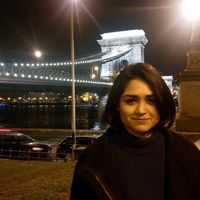Azka Zia
Central European University, International Relations and European Studies, Graduate Student
- Aspiring novelist, studying International Relations and European Studies in Budapest.edit
The Israeli Defense Forces (IDF) responds to allegations of violence toward Palestinians by arguing in a number of ways: the violence was in self-defense, it was an appropriate and legally permitted response, and/or that it is a rare... more
The Israeli Defense Forces (IDF) responds to allegations of violence toward Palestinians by arguing in a number of ways: the violence was in self-defense, it was an appropriate and legally permitted response, and/or that it is a rare occurrence and not reflective of the military’s values. However, research indicates Israeli soldiers categorize Palestinians into an undistinguishable enemy, most investigations into illegal behavior are closed with inadequate explanation, and violence to Palestinian life and destruction of their property and daily routine is part and parcel of soldiers’ experience in the West Bank- even when their work, such as checkpoint duty, itself is not violent. Through analysis of soldiers’ testimonies, drawing on investigations of human rights organizations’ reports, and building from scholarly research on the interplay of themes of power and morality, I uncover a number of rationalities upon which IDF soldiers depend on when explaining harmful practices and abuse toward the Palestinian population. My project is two-fold: to uncover the hybridity of rationales that are used to cause and legitimize destruction of Palestinian life and property, and through this to highlight the characteristics of routine and ordinariness this destruction has acquired. When Palestinian lives are lost or maimed, Israeli actors do not see the occurrences as deserving of any political importance: no one is made to take responsibility, no court case is launched, no policymaker is forced to resign. In a sense, there exists a norm that this is nothing exceptional, whereas loss of Israeli life can be met with nation-wide mourning and extensive media coverage. Clearly, a hierarchy exists, where Palestinian loss is not seen deserving as much weight. My thesis grapples with the following questions: How does violence become normalized? How has a hierarchy come to cement itself so pervasively in the military force? How are some lives not deemed important as others?
Supervisor: Michael Merlingen
Supervisor: Michael Merlingen
